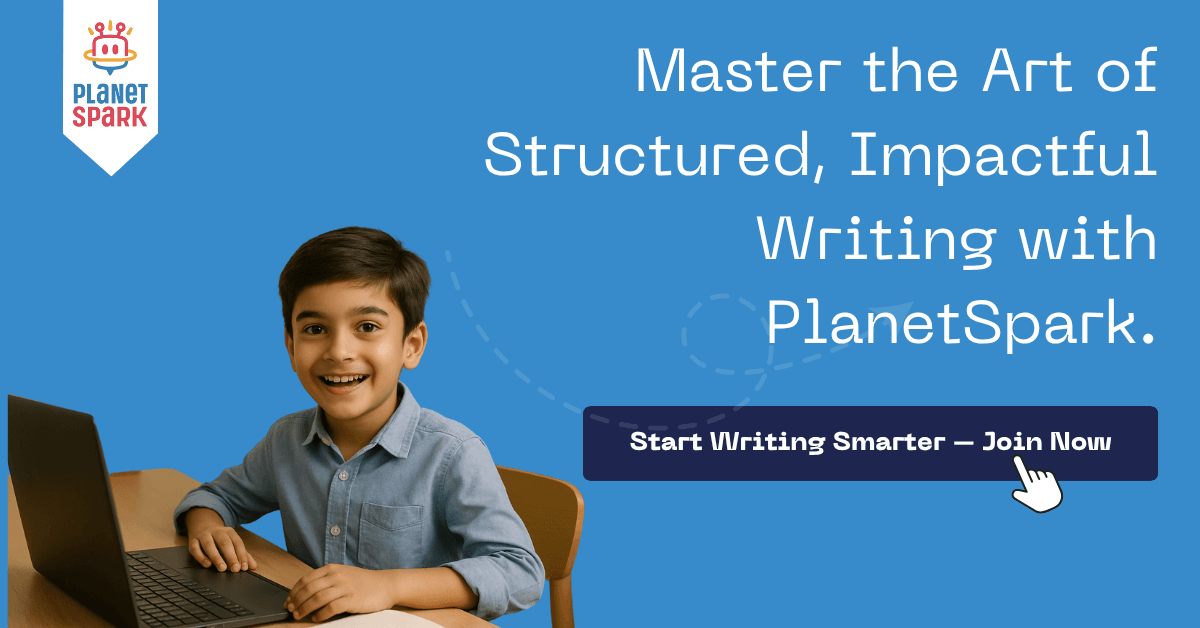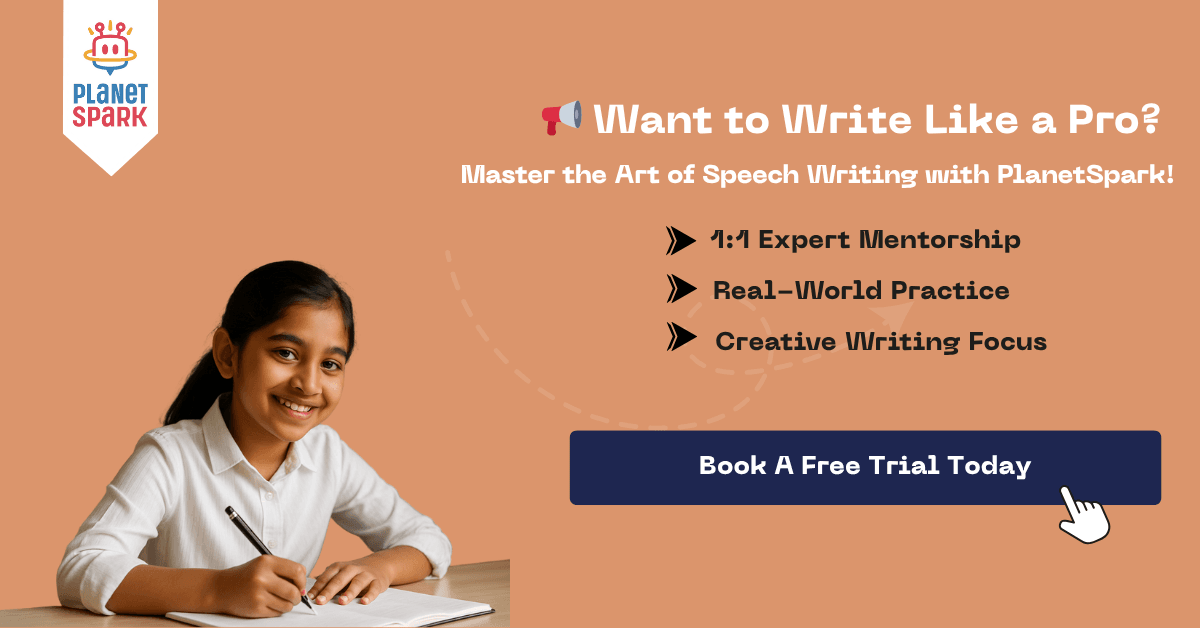How to Write a Speech: Step-by-Step Guide for Beginners

Struggling to write a speech that leaves an impact? Whether you're a student preparing for a school event, a professional speaking at a conference, or someone giving a toast at a wedding, this blog is your one-stop guide. In this comprehensive post, we’ll break down how to write a speech from scratch from understanding your audience to crafting a powerful conclusion. You’ll also find practical tips, real examples, a free speech template, and an exclusive look at how PlanetSpark’s Creative Writing Program can help you sharpen your kid's speech-writing skills.
Why Learning How to Write a Speech Matters
Speech writing is not just about putting words on paper. It’s about expressing ideas that inspire, inform, or persuade. A well-written speech can:
- Boost your confidence in public speaking
- Help you connect emotionally with your audience
- Clarify complex ideas in a compelling way
- Leave a lasting impression
Whether it’s a TEDx talk, a class presentation, or a corporate pitch a great speech can change minds, open doors, and move hearts.
Great speeches have shaped history, sparked revolutions, and inspired generations. From Martin Luther King Jr.’s "I Have a Dream" to Malala Yousafzai’s speech at the United Nations, the ability to write and deliver a compelling message is one of the most powerful tools anyone can possess. In today’s world, where communication is key, speech writing is not just a skill, it’s a superpower.

How to Write a Speech: A Step-by-Step Process
Know Your Audience
Before you write a single word, ask yourself: Who am I talking to?
- Age group: Kids, teenagers, adults?
- Context: Formal, casual, or academic?
- Expectations: Are they looking for entertainment, information, or inspiration?
Understanding your audience helps you choose the right tone, vocabulary, and structure.
Tailoring your speech to the audience makes all the difference. A speech to 5th graders will look and sound entirely different from a keynote at a business summit. The better you know your listeners, the easier it becomes to speak their language and make your message stick.
Define the Core Message
Every great speech revolves around a single powerful idea. This is your core message, the takeaway you want your audience to remember.
Example:
- Topic: Climate Change
- Core Message: "It’s not too late to make a difference every action counts."
Write this sentence down and build everything else around it.
Your core message should be short, punchy, and crystal clear. Think of it as the 'thesis statement' of your speech. Keep referring back to it throughout your speech to maintain coherence and focus.
Structure Your Speech
A good speech has a clear structure:
- Introduction: Hook your audience and introduce the topic.
- Body: Present your main points with evidence and examples.
- Conclusion: Summarize and end with a strong closing line or call to action.
Each section should flow naturally into the next, using transitions and signposting phrases like "Let me explain" or "On the other hand."
A structured speech ensures that your audience can follow along. It helps avoid rambling and keeps your speech within the time limit.
Write a Captivating Opening
First impressions matter. Your opening should grab attention and set the tone.
Try these techniques:
- Ask a powerful question
- Share a personal story
- Use a surprising fact
- Quote someone famous
Example:
"Imagine a world where every child can read, write, and speak with confidence. Now, stop imagining because you can help make it real."
Your opening should relate directly to the audience’s interests, values, or emotions. If you get this right, they’ll stay with you for the rest of your speech.
Develop the Body with Logic and Emotion
This is the heart of your speech. Divide your content into 2–3 key points, each supported by:
- Facts or statistics
- Real-life examples
- Personal experiences
- Emotional appeals
Balance logic with feeling. Let your personality come through.
Remember to vary your sentence structure and keep paragraphs short. Use rhetorical questions or pauses to create drama or reflection. This is your chance to shine, so tell stories that resonate and give life to your points.
Craft a Memorable Conclusion
Your ending should be just as strong as your opening.
Tips:
- Recap your main message
- Reinforce your core idea
- Leave the audience with a call to action or a rhetorical question
Example:
"If we don’t act now, who will? If not today, when?"
A great conclusion will stay in your audience’s minds long after the speech ends. Use your last few lines wisely, this is your moment to drive the message home.
Pro Tips for Great Speech Writing
- Use simple language: Clarity beats complexity.
- Repeat key ideas: Repetition adds emphasis and rhythm.
- Use rhetorical devices:
- Repetition: "I have a dream…"
- Anaphora: Starting sentences with the same word
- Metaphors: Make abstract ideas relatable
- Read aloud while writing: It helps with flow and natural phrasing
- Time yourself: Make sure your speech fits the time limit
- Record yourself: Listening to your delivery helps refine tone and pace
- Get feedback: A second pair of ears can point out what you missed
These pro tips will help you not just write a speech, but master the art of delivery.
Common Mistakes to Avoid
- Being too wordy: Respect the audience’s attention span.
- Reading word-for-word: Practice enough to speak naturally.
- Ignoring body language: Non-verbal cues matter.
- Lack of structure: Wandering speeches lose attention.
- Neglecting the audience: Always speak to your listeners, not at them.
- Forgetting to practice: Writing isn’t enough rehearsing is half the battle.
Public speaking is part performance. If your delivery lacks energy, even the best-written speech won’t land.

Sample Speech 1: "The Power of Reading"
Introduction:
Imagine a world without stories, without books, and without imagination. No magical lands to escape to, no characters to relate with, and no words to inspire us. Sounds dull, right? Today, I want to talk about something that has truly changed my life , the power of reading.
Body:
Reading is more than just a school activity, it’s a superpower. Every book we read introduces us to new ideas, people, and cultures. Whether it’s a book about ancient Egypt or a novel set in the future, each one teaches us something new.
Reading also fuels our imagination. When I read, I feel like I’m traveling to different worlds, without ever leaving my room! I can ride dragons, solve mysteries, or explore the ocean depths. Books make the impossible feel possible.
It also improves the way we speak and write. I’ve learned so many new words, phrases, and even ways of expressing my thoughts just by reading different kinds of books. It has helped me become more confident in both school and life.
Conclusion:
So, the next time you're bored or looking for something fun to do, pick up a book. You never know, it might take you on an unforgettable journey. Reading doesn’t just pass time it opens minds, sparks ideas, and builds your future, one page at a time.
Sample Speech 2: "Why We Must Protect Nature"
Introduction:
Have you ever thought about what would happen if all the trees disappeared or if our rivers dried up? Imagine waking up to a sky full of smoke and no clean water to drink. Sounds scary, right? Nature isn’t a luxury it’s our lifeline. And today, I want to share why protecting it should be our top priority.
Body:
Our environment is under serious threat. Forests are being cut down, oceans are getting polluted, and animals are losing their homes. If we don’t act now, we may not have much nature left to protect in the future.
But here’s the good news small steps can create big change. Recycling at home, planting a tree, using less plastic these may seem like simple acts, but they matter a lot. If each one of us does our part, we can make a huge difference.
Most importantly, protecting the Earth isn’t just the job of scientists or world leaders. It’s our responsibility too. Whether we’re students or adults, we all share this planet. What we do today will decide what kind of world we leave for tomorrow.
Conclusion:
Let’s not wait for disasters to remind us of nature’s value. Let’s care, act, and protect it every single day not just for ourselves, but for future generations. Because when we protect nature, we protect life itself.
Examples of Great Speech Openings
Here are some iconic and effective speech openings:
Barack Obama:
"Tonight is a particular honor for me because - let's face it - my presence on this stage is pretty unlikely."
Malala Yousafzai:
"One child, one teacher, one book, one pen can change the world."
Student Speech Example:
"Two years ago, I was afraid to even say my name out loud. Today, I’m here speaking to all of you and that’s the power of finding your voice."
Business Presentation Example:
"Last quarter, we faced a crisis. But today, I’ll show you how we turned that into a breakthrough."
Powerful Conclusion Lines
“Great ideas begin with small actions , let’s begin today.”
“Every ending sparks a new beginning. Let this be yours.”
“You’ve heard my story, now go create your own.”
“It’s not just a speech. It’s a step toward change.”
Free Speech Writing Template
Recreate this basic speech outline:
Introduction
- Hook:
- Topic introduction:
- Core message:
Body (2–3 Main Points)
- Point 1:
- Example/story:
- Point 2:
- Example/story:
- Point 3 (optional):
- Example/story:
Conclusion
- Summary:
- Final message:
- Call to action:
Use this as a base and personalize your message.
Want help filling it in? Try practicing with a friend or mentor, or consider joining a writing class to get expert feedback.
Conclusion
Writing a speech is not about being perfect, it’s about being authentic, clear, and memorable. When you structure your thoughts, know your audience, and practice delivery, your words will leave an impact. Use the steps in this guide to craft your next speech with confidence.
And if you’re looking to go deeper to refine your writing style, develop your storytelling, and master public speaking keep reading.
Boost Your Skills with PlanetSpark’s Creative Writing & Public Speaking Program
At PlanetSpark, we help students transform into powerful communicators. Our Creative Writing and Public Speaking courses are designed to:
- Build strong writing foundations
- Teach speech and story structure
- Enhance vocabulary and grammar
- Develop storytelling and emotional intelligence
- Provide live 1:1 mentorship and feedback
Students work on speeches, debates, TED-style talks, and real-world communication skills. They learn not just what to say but how to say it.
Here’s what one student says:
"Before joining PlanetSpark, I used to avoid speaking in class. Now, I’ve delivered three speeches in school and even won a prize!"
Want your child to become a confident speaker and writer?
👉 Visit PlanetSpark’s Creative Writing Program and book a free trial today!
Personalized Communication Report
Record a video to get a AI generated personalized communication report for your child

Hi There, want to try these
tips for your child with
LIVE with our expert coach?
Let's check your child's
English fluency
